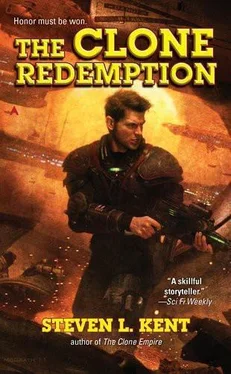Steven Kent - The Clone Redemption
Здесь есть возможность читать онлайн «Steven Kent - The Clone Redemption» весь текст электронной книги совершенно бесплатно (целиком полную версию без сокращений). В некоторых случаях можно слушать аудио, скачать через торрент в формате fb2 и присутствует краткое содержание. Жанр: Боевая фантастика, на английском языке. Описание произведения, (предисловие) а так же отзывы посетителей доступны на портале библиотеки ЛибКат.
- Название:The Clone Redemption
- Автор:
- Жанр:
- Год:неизвестен
- ISBN:нет данных
- Рейтинг книги:4 / 5. Голосов: 1
-
Избранное:Добавить в избранное
- Отзывы:
-
Ваша оценка:
- 80
- 1
- 2
- 3
- 4
- 5
The Clone Redemption: краткое содержание, описание и аннотация
Предлагаем к чтению аннотацию, описание, краткое содержание или предисловие (зависит от того, что написал сам автор книги «The Clone Redemption»). Если вы не нашли необходимую информацию о книге — напишите в комментариях, мы постараемся отыскать её.
The Clone Redemption — читать онлайн бесплатно полную книгу (весь текст) целиком
Ниже представлен текст книги, разбитый по страницам. Система сохранения места последней прочитанной страницы, позволяет с удобством читать онлайн бесплатно книгу «The Clone Redemption», без необходимости каждый раз заново искать на чём Вы остановились. Поставьте закладку, и сможете в любой момент перейти на страницу, на которой закончили чтение.
Интервал:
Закладка:
Five hundred thousand evacuees from Gobi, eight million from Bangalore—the numbers added up quickly. Sooner or later, we’d be hauling fifty million refugees. What would we do at that point?
The Avatari were rolling through the galaxy, and we were trying to keep ahead of the storm instead of working our way around it. Sooner or later, we would need to start settling one of the planets that the aliens had already incinerated. If we moved refugees anywhere else, we would need to move them again.
“What do you think the Unifieds will do when the aliens reach Earth?” Nobles asked. “Think they’ll ask us for help?”
“They might,” I said. “I think they’d rather kill us and take their barges back. If they can’t, they’ll probably ask for help.”
“Yeah, well, if Tobias Andropov asks me for a ride, I’ll tell him to kiss my ass,” said Nobles. Andropov was the senior member of the Linear Committee, making him the most powerful politician in a mortally wounded republic.
We entered the atmosphere, the shuttle’s sleek profile piercing the bubble with very little resistance. When transports fly down to planets, they batter their way into the atmosphere with all of the grace of a hammer hitting glass. My shuttle pierced it like a needle.
“I heard they wanted to set up undersea cities,” said Nobles.
Before becoming a Unified Authority signee, the French government had launched an undersea mining and colonization program called the Cousteau Oceanic Exploration program. They hoped to form an alliance that would rival the U.A.’s space-exploration alliance, but only Tahiti signed on.
“I heard that, too,” I said.
“Think they can go deep enough?” Nobles asked.
“Depth isn’t the problem.” Forty feet down would be deep enough. The French built a city called Mariana that was three miles down. It only held five thousand people. I said, “Size is the problem. Their undersea cities are too specking small.”
“That’s funny,” said Nobles. “Now they know how it feels.”
The shuttle handled atmospheric travel like a jet, channeling air currents to turn and rise and dive. Nobles slowed us to a sluggish three hundred miles per hour as we dropped toward the clouds. It was night, moonlight made the clouds gray, and the ocean below us was black. Wherever I looked, I saw transports muscling their way through the sky, looking no more aerodynamic than bumblebees, and exceptionally clumsy at that.
Nobles whistled, and said, “Man, we really specked them over when we stole their barges.”
“They specked themselves,” I said, remembering how the Unified Authority had forced the clone military into rebellion.
A twisted peel of clouds veiled my view of the city below. Pockets of lights sparkled in the darkness on the ground. Evacuation centers, I thought.
A few minutes passed, and we flew over the city. We slowed as we approached a sports stadium that had been converted into a spaceport. Three transports rose from its rim, dozens more sat side by side on its open field. The lines of people packed around them looked like grains of sand.
The entire scene was awash with light. Bright lights showered down around the rim of the stadium, orange-tinted lights mapped the parking lot, and a long, slow-moving line of headlights traced the street leading into stadium.
Just a few moments later, we passed a bubble of light that resolved itself into a shopping mall, its enormous parking lot converted into a landing strip. A sea of people covered the parking area.
We flew to the Bangalore pangalactic spaceport, the hub of the evacuation. Transports, which have skids instead of wheels, can land in tight spaces and on tiny platforms in sports stadiums and shopping centers. My shuttle had wheels. We needed a runway.
The control tower cleared us, and Nobles set us down. It happened that fast. Three officers met us as we left the shuttle. As I left the shuttle, I inhaled a jolt of ozone. Some of our transport pilots were flying with their shields up. The shields generated ozone. With so many transports flying in and out of the atmosphere, I wondered what kind of pollution problems the ozone might create. Whatever problems it created, they would not last long.
The officers had a sedan waiting on the runway. They hustled me into my seat, and we drove into the city.
In the minutes it took me to get through Gandhi Spaceport, I saw two, maybe three, hundred passengers charging toward a transport made to carry one hundred people. The stampede left bloody bodies in its wake.
We passed roads clogged with panicked refugees and a city with masses who looked ready to riot. “Slow down,” I told the driver, as we passed a corner on which armed soldiers manning a chest-high barricade tried to hold back a crowd.
“Stop the car,” I said.
I climbed out of the car. The people looked terrified, so did the officers who had come to organize the evacuation.
“A hundred at a time,” I mumbled.
“What was that?” asked one of the officers.
“Nothing,” I said. “Just thinking out loud.” Evacuating a planet with eight million people in transports that were only capable of carrying one hundred refugees at a time seemed incredibly inefficient. It took ten thousand transports to move one million people, and it would take eighty thousand to empty this planet. Eighty thousand liftoffs …Eighty thousand dockings …
The officers drove me to an Air Force base, where a small knot of Marines came out to greet me. We traded salutes and pleasantries. Admiral Liotta had placed my Marines in charge of looking for food and dealing with looters. Armed troops carrying M27s patrolled the streets. Looters would not be offered evacuation. The Marines had orders to shoot them on sight.
“How is the evacuation going?” I asked one of the Marines.
“It’s a mess, sir,” said the colonel in charge. “I don’t know who came up with these evacuation plans, but we’re finding looters on every street. It’s a mess.”
A Marine captain said, “General, these people are scared. We’re herding them like cattle, and they’re scared of us. They’re even more scared we’re going to leave them behind.”
“I can take you to see what we’re dealing with if you want, General,” the colonel offered.
I shook my head and turned to one of Liotta’s officers. “Will we get them all out?” I asked.
“It’s going to be close, sir,” he said.
“How about supplies?” I asked. “Do we have enough time to gather supplies?”
“We already gathered ’em. We’ve had teams out all day. We have the food and the medicine. All we need now is transports to lift the supplies out.”
“Where are the supplies?” I asked.
“Stacked up and ready at the spaceport.”
“Outstanding,” I said. “So the supplies we need will be in neat stacks when they burn to dust.”
“But, sir …” Liotta’s officer started to explain himself, then thought better of it and fell silent.
“Where is Admiral Liotta?” I asked the officer.
“I’m not sure, sir. He might be at Gandhi.”
“Back at the spaceport?” I asked. “Well that’s excellent. Let’s go find him. You can show me the supplies when we get there.”
I’d lost track of Ray Freeman since the last time we’d contacted Sweetwater. I ran into him as we left the Air Force base. He stood outside the gate looking more tired and old than I had ever seen him, his dark skin blending into the shadows as he waited for my car to clear the gate.
I told the driver to wait for me and climbed out of the car. I walked on the loose gravel along the side of the road and approached Freeman. I asked, “What are you doing here?”
“You listed me as a civilian advisor,” he said. “I came here to advise.”
Читать дальшеИнтервал:
Закладка:
Похожие книги на «The Clone Redemption»
Представляем Вашему вниманию похожие книги на «The Clone Redemption» списком для выбора. Мы отобрали схожую по названию и смыслу литературу в надежде предоставить читателям больше вариантов отыскать новые, интересные, ещё непрочитанные произведения.
Обсуждение, отзывы о книге «The Clone Redemption» и просто собственные мнения читателей. Оставьте ваши комментарии, напишите, что Вы думаете о произведении, его смысле или главных героях. Укажите что конкретно понравилось, а что нет, и почему Вы так считаете.












